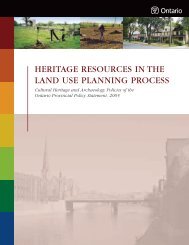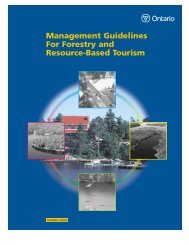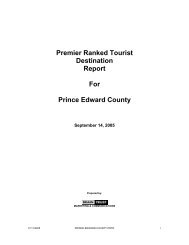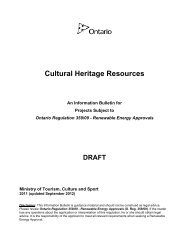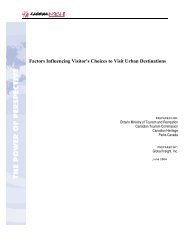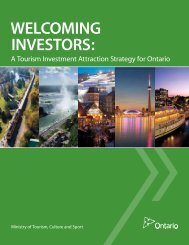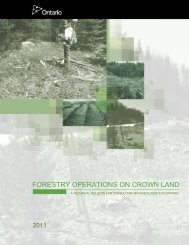Main Presentation Speaker Notes
Main Presentation Speaker Notes
Main Presentation Speaker Notes
You also want an ePaper? Increase the reach of your titles
YUMPU automatically turns print PDFs into web optimized ePapers that Google loves.
Supporting Heritage in Your Community<strong>Main</strong> <strong>Presentation</strong> - <strong>Speaker</strong> <strong>Notes</strong>Use the following notes in conjunction with the main presentation.
Slide 1Introduce yourself and your team.Suggested <strong>Speaker</strong> <strong>Notes</strong>• This is a brief presentation about heritage in our community, and its contributionsto both our economy and to our quality of life.Slide 2For More Information• Strengthening Ontario’s Heritage, Page 2Suggested <strong>Speaker</strong> <strong>Notes</strong>• Our heritage is a big part of what makes a community unique.• Ontario’s identity and character are rooted in our rich and diverse heritage.• Heritage enhances our quality of life and sense of place. It reflects the distinctexpressions and aspirations of our community and its culture.• Heritage is not just about the past. It is about the places, spaces and stories that wevalue today and saving and preserving them for tomorrow.Slide 3For More Information• Strengthening Ontario’s Heritage, pages 3-5• http://www.advocacyaction.org/english/pays/introduction.htmSuggested <strong>Speaker</strong> <strong>Notes</strong>• Historic places and heritage buildings are fundamental to our sense of history,community and identity.• Communities across Canada, the United States, and abroad have been capitalizing ontheir distinctive heritage assets by revitalizing their historic business cores andreclaiming them as the commercial and social hubs of the community.• Besides economic value, heritage resources have intrinsic value in the informationthey contain about the past. They can teach us a great deal. Who lived here? Whathappened here?• Buildings, landscapes and archaeological sites can give us a unique insight into ourpast – knowledge that sometimes cannot be obtained any other way. Our heritagehelps us make sense of our rapidly changing world and guides us into the future.Well-maintained historic buildings, streetscapes and landscapes contribute to safe andcomfortable neighbourhoods and foster local identity and pride.
Slide 4For More Information• http://www.advocacyaction.org/english/tourism/introduction.htm• Copies of Built Heritage: Assessing a Tourism Resource are available through theoffice of the Heritage Canada Foundation, Ottawa, OntarioSuggested <strong>Speaker</strong> <strong>Notes</strong>What attracts tourists? Original heritage buildings and sites, historic architecture, naturaland cultural landscapes. Surprisingly to some, Canada’s built heritage is a significantmotivation for international visitors to travel to Canada. Of long-haul travellersinterested in travelling to Canada, 74 per cent want to visit historical buildings and sites,and 85 per cent want to visit interesting small towns and villages (France StrategicSegmentation Study Final Report, August 1999). Heritage tourism is a major market.Every year, Doors Open Ontario attracts large crowds across Ontario. Both residents andvisitors participate, discovering first-hand Ontario’s heritage treasures.Slide 5For More Information:• Copies of Preservation Pays – the Economics of Heritage Conservation are availablethrough the office of the Heritage Canada Foundation, Ottawa, Ontario• The Architectural Conservancy of Ontario notes on Demolition Myths can be foundat http://www.arconserv.caSuggested <strong>Speaker</strong> <strong>Notes</strong>The greenest building is the one that already exists. Old buildings embody energy andmaterials. Reusing older buildings saves the destruction of trees, saves the energy used totransport them to mills and create new construction materials, and saves more greenspace from development. Heritage conservation saves demolition, land development andconstruction time costs. It helps retain or create high-skilled jobs. It develops the marketvalue of existing buildings and neighbourhoods while contributing to economicdevelopment such as cultural tourism. Heritage conservation contributes to developing aculture of repair and reuse. Rehabilitating heritage streetscapes and buildings –sometimes starting with the restoration of a single community landmark – can generate awhole range of economic benefits.The Cambridge Example• http://v1.theglobeandmail.com/servlet/story/LAC.20051124.ROCHON24/TPStory/?query=A+university%92s+Grand+idea• The Globe and Mail: A university’s Grand idea – Waterloo’s relocated School ofArchitecture has injected new life into a former silk mill and a flagging community(Lisa Rochon, 24/11/05)
Slide 6For the entire interview:http://www.preservationnation.org/magazine/2006/july-august/the-shortanswerdonald.htmlSuggested <strong>Speaker</strong> <strong>Notes</strong>In an interview with the National Trust for Historic Preservation, Donald Trump, NewYork City real estate developer, said that not only can development and historicpreservation exist side by side, it’s actually cheaper to use an existing structure.Slide 7For More Information• The Rutgers University study, Partners in Prosperity: The Economic Impacts ofHistoric Preservation, can be found athttp://www.state.nj.us/dca/njht/publ/downloading_partners_prosperity.htmlSuggested <strong>Speaker</strong> <strong>Notes</strong>• These figures are in US funds.• For some Canadian examples and studies of adaptive reuse, you or your audiencemight be interested in The Lazarus Effect by Robert Shipley. It can be found athttp://environment.uwaterloo.ca/research/hrc/documents/lazarus-jan20-verA.pdfSlide 8For More Informationhttp://www.e-laws.gov.on.ca/html/statutes/english/elaws_statutes_90o18_e.htmNoteThe Ontario Heritage Act is enabling legislation. Until your municipality begins to enactthe OHA, such as passing designation by-laws, actions such as establishing a municipalheritage committee are not compulsory.Suggested <strong>Speaker</strong> <strong>Notes</strong>Municipal councillors, staff and volunteers can have a tremendous impact on heritage by:• Creating a municipal heritage committee and providing it with resources (such astraining).• Setting the municipal budget for heritage conservation and cultural tourisminitiatives.• Establishing heritage conservation policies in the official plan.• Making land use planning / development decisions that respect heritage.• Supporting local heritage activities.• Staff roles vary from municipality to municipality, but heritage conservation caninvolve almost everyone from the clerk’s office to the fire department.• Owners of designated properties also have roles to play under the Ontario HeritageAct.
The municipal heritage committees assist council in exercising its powers under theOntario Heritage Act and carrying out other heritage preservation activities, includingliaising between council and property owners.Other participants in heritage might be the local media, tourism associations andprofessionals, business associations, historical societies and cultural centres.Slide 9For More Informationhttp://www.mtc.gov.on.ca/en/publications/Strength_Heritage.pdfSuggested <strong>Speaker</strong> <strong>Notes</strong>We often think of heritage in terms of the past, but we see heritage and interact with it ona regular basis, often without even realizing it. Heritage is not only about researching ourfamily history or visiting a community museum; it’s walking through a cemetery, drivingacross an old bridge, attending a fall fair, working in an office in a refurbished factory,giving directions using local community landmarks.There are three key steps in heritage conservation: identification, protection andpromotion.Slide 10Use this slide to lay out some of the things you’d like to do in 2007. What you want youraudience to do? What do you need from council to turn those opportunities intosuccesses?A few questions to help you put this information into the context of your community:1. What heritage resources does your community have?2. Does your municipality have a municipal heritage committee?3. What links does heritage have to economic activity and development in yourcommunity?4. What opportunities are there for further links?5. Who in your community is involved in protecting and promoting heritage?6. How would you like to get / be more involved?7. How can your municipality play a more leading role in heritage?8. What are the tools which your municipality can implement to help protectheritage?Suggested <strong>Speaker</strong> <strong>Notes</strong>Our MHC has a strategic plan to propose. Our strategies include…


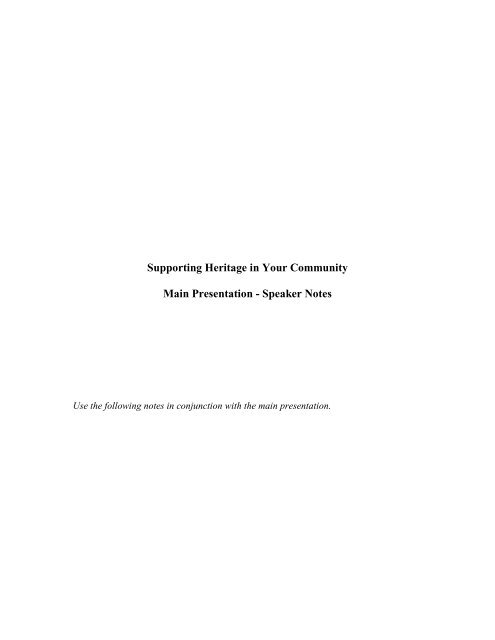
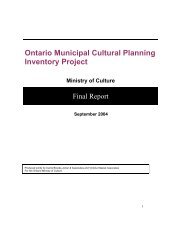
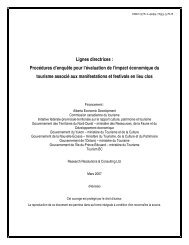
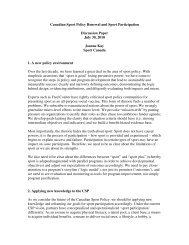
![THIS AGREEMENT made this [date], between [name of owner] (the ...](https://img.yumpu.com/49827605/1/158x260/this-agreement-made-this-date-between-name-of-owner-the-.jpg?quality=85)


